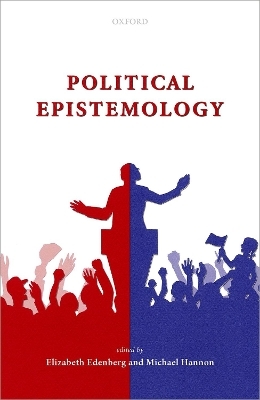
Political Epistemology
Oxford University Press (Verlag)
978-0-19-289333-8 (ISBN)
This collection explores one of the most rapidly growing area of philosophy: political epistemology. Epistemological issues are at the center of our political lives. It has become increasingly difficult to discern legitimate sources of evidence, misinformation spreads faster than ever, and the role of truth in politics has allegedly decayed in recent years. It is therefore no coincidence that political discourse is currently saturated with epistemic notions like “post-truth,” “fake news,” “truth decay,” “echo chambers,” and “alternative facts.”
Political Epistemology brings together leading philosophers to explore ways in which the analytic and conceptual tools of epistemology bear on political philosophy, and vice versa. It is organized around three broad themes: truth and knowledge in politics; epistemic problems for democracy; and disagreement and polarization. The contributors provide new and rich insights on topics such as: propaganda, fake news, weaponized skepticism, belief polarization, political disagreement, the epistemic value of democracy, voter ignorance, irrationality in politics, and identity politics. A premise underlying the development of political epistemology is that progress on certain foundational issues in both political philosophy and epistemology cannot be achieved without sharing insights across fields, beyond a certain point. This will be a foundational text for philosophers, political scientists, and political psychologists for years to come.
Elizabeth Edenberg is Assistant Professor of Philosophy at Baruch College, The City University of New York. She specializes in political philosophy, political epistemology, and the ethics of emerging technologies. Edenberg is the co-editor of 'Jus Post Bellum' and Transitional Justice (with Larry May; Cambridge University Press, 2013). Michael Hannon is Assistant Professor of Philosophy at the University of Nottingham and founder of the Political Epistemology Network. He is author of What's the Point of Knowledge? A Function-First Epistemology (Oxford University Press, 2019).
List of Contributors
Elizabeth Edenberg & Michael Hannon: Introduction
PART 1: Truth and Knowledge in Politics
1: Elizabeth Anderson: Epistemic Bubbles and Authoritarian Politics
2: Regina Rini: Weaponized Skepticism: An Analysis of Social Media Deception as Applied Political Epistemology
3: Quassim Cassam: Bullshit, Post-truth, and Propaganda
4: Fabienne Peter: Truth and Uncertainty in Political Justification
5: Briana Toole: What Lies Beneath: The Epistemic Roots of White Supremacy
PART 2: Epistemic Problems for Democracy
6: David Estlund: Epistocratic Paternalism
7: Thomas Christiano: The Basis of Political Equality
8: Jason Brennan: Does Public Reason Liberalism Rest on a Mistake? Democracy's Doxastic and Epistemic Problems
9: Alexander Guerrero: The Epistemic Pathologies of Elections and the Epistemic Virtues of Lottocracy
10: Kristoffer Ahlstrom-Vij & Jennifer R. Steele: Policy, Ignorance, and the Will of the People: The Case of 'Good Immigrants'
PART 3: Disagreement and Polarization
11: Robert B. Talisse: Problems of Polarization
12: Jeroen de Ridder: Deep Disagreements and Political Polarization
13: Michael Lynch: Political Disagreement, Arrogance, and the Pursuit of Truth
14: Elizabeth Edenberg: The Problem with Disagreement on Social Media: Moral not Epistemic
15: Jennifer Lackey: When Should We Disagree About Politics?
16: Michael Hannon: Disagreement or Badmouthing? The Role of Expressive Discourse in Politics
| Erscheinungsdatum | 23.07.2021 |
|---|---|
| Reihe/Serie | Mind Association Occasional Series |
| Verlagsort | Oxford |
| Sprache | englisch |
| Maße | 162 x 242 mm |
| Gewicht | 650 g |
| Themenwelt | Geisteswissenschaften ► Philosophie ► Erkenntnistheorie / Wissenschaftstheorie |
| ISBN-10 | 0-19-289333-5 / 0192893335 |
| ISBN-13 | 978-0-19-289333-8 / 9780192893338 |
| Zustand | Neuware |
| Informationen gemäß Produktsicherheitsverordnung (GPSR) | |
| Haben Sie eine Frage zum Produkt? |
aus dem Bereich

![Was heißt Denken?. Vorlesung Wintersemester 1951/52. [Was bedeutet das alles?] - Martin Heidegger](/media/113619842)
